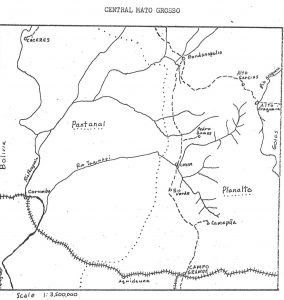21 Television comes to Campo Grande
Television and Culture
As a kid in the early 1950’s, television became available in our town of Berthoud, Colorado. I asked Dad “Can we get one?”
Dad responded, “We have lots of books to read: we don’t need to be watching this junk.”
He was very adamant that television was not good for society, and we were not going to corrupt our lives. Well, I did not have much choice. I had plenty of things to do on the farm with my animals, particularly my horses. And ok, there were lots of books.
Kids at school excitedly shared what they were watching on television, and I got to see it when I visited them at their homes. There were a lot of cartoons and westerns, “cowboys and Indians” as they were called. Some of the kids felt sorry for me and invited me over just to watch television, which I did not do very often.
After I went off to college, Dad finally got a black and white TV and put it in his bedroom. To limit its influence he locked the channel changer on the public broadcasting station (PBS) because it had news about the world and educational programs. I developed an attitude that TV was ok but not necessary.
In the mid 60’s I was serving in the Peace Corps in the rural village of Pedro Gomes, about a six hour drive by bus from Campo Grande, Mato Grosso do Sul, Brazil. (See hand drawn map) On occasion, about monthly, I would come into town to check in with the Peace Corps office. But, I always wanted my visit to include Sunday afternoon because that was when about a mile of Rua Catorze de Julio, was closed to automobiles.

 Rio Verde do Mato Grosso is located about 150 kilometers north of Campo Grande. Hand drawn map by Rick Bein 1966
Rio Verde do Mato Grosso is located about 150 kilometers north of Campo Grande. Hand drawn map by Rick Bein 1966
The “Passeio” was a wonderful tradition when people would promenade up and down the street greeting each other, visiting and catching up on news. Families would walk together greeting other families. Groups of teenage girls would walk arm and arm smiling at groups of teenage boys passing the other way. Engaged couples would walk together demonstrating to the community their commitment to each other. It seemed that the whole town enjoyed this tradition. It was a major bonding activity.

Passeio Brasileiro na Rua XV by Dylan Passmore is licensed free under CC BY-NC 2.0. 2014.
One Sunday afternoon late in 1965, I arrived in Campo Grande about 3:00 and proceeded to Rua Catorze de Julio for the walk to the “pensão” where I would stay. As I turned onto the street, I saw nothing was happening, cars were driving as usual, and very few people were out.
When I arrived at the pensão, no one was in the reception area. I heard what I thought was a radio in a room to the side and I thought some earth shattering event had taken place and everyone was listening to the news. I immediately proceeded to that room to see what had happened.
To my surprise as I walked into the room, I saw a crowd around a black and white television watching Popeye cartoons. An earth shattering event had happened; television arrived in Campo Grande.
For weeks prior to this there had been a campaign to sell enough television sets in Campo Grande so that a television station would begin broadcasting. Now it had started.
What a disappointment to see the wonderful tradition of the Passeio disappear overnight, to be taken over by American cartoons dubbed in Portuguese; they were hard enough to understand in English let alone in another language. Then there were the old fake wrestling films that occupied everyone’s attention. I was aghast! Hop-Along Cassidy was a big hit! All the garbage that America had accumulated over the last 15 years was being unloaded in the back country of Brazil. Progress is not always beautiful.

Pop eye the “Sailor Man” by Ciro Boro – photo is licensed free under CC BY-NC-SA 2.0

